牛津译林版高中英语必修一Unit 2《Growing pains》(Period 4)课件
牛津译林版高中英语必修一Unit 2《Growing pains》(Language reading)教案
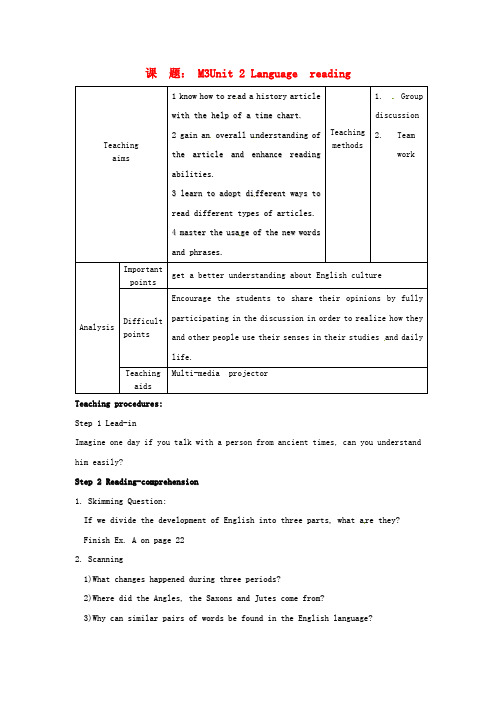
reading history articles.
教学反思:
3 learn to adopt di fferent ways to read different types of articles.
4 master the usa ge of the new words and phrases.
Teaching
methods
1. Group discussion
4) What was the German plural form replaced by?
5) Which King of England made Englis h used as the official language?
6) When did Modern English appear projector
Teaching procedures:
Step 1 Lead-in
Imagine one day if you talk with a person from ancient times, can you understand him easily?
课题:M3Unit 2 Language reading
Teaching
aims
1 know how to re ad a history article with the help of a time chart.
2 gain an overall u nderstanding of the article and enhance reading abilities.
牛津译林版高中英语必修一Unit 2《Growing pains》(Project)教案

【教学难点】Howto write a report on a certain kind of growing pains.
【教具】Multi-media projector
【教学过程】
Language points
1.at the moment: at this / that moment
eacheverytimedvdhesendsmebednexttimeyouseemepleasereturnmethough作连词引导一个方式从句或标语从句用在looksmelltastesound等词后表真实情况用陈述语气thoughsomeonethough用于虚拟语气hespeaksthoughhekneweverything
She insists on writing at once
being sent to the front
Insist that宾语从句坚持要求( should) do
坚持认为、说从句前后一致
She ins isted that she (should) be sent to the front.
it is necessary to help him.
课题:M1U2 Project
【教学目标】
1. Tohave a better understanding of growing pains.
2. To cooperat e with others to write a report on a certain kind of growing pains they are interested in.
4.forbid vt ( forbade, forbidden) = not allow / permit
牛津译林版高中英语必修一Unit 2《Growing pains》(Practise the lan
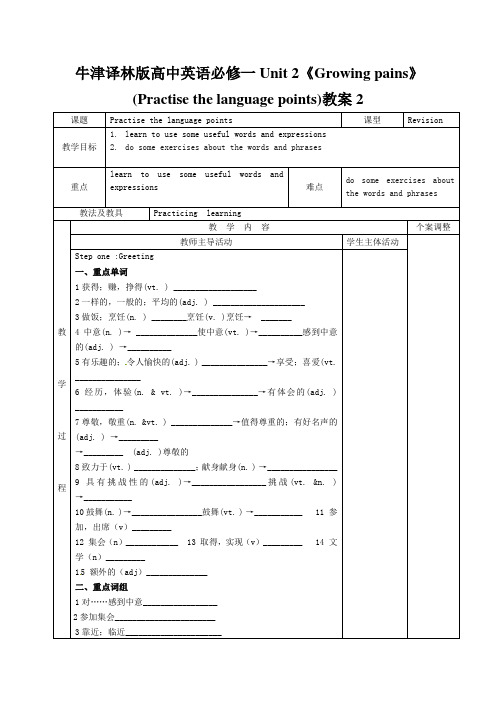
牛津译林版高中英语必修一Unit 2《Growing pains》(Practise the language points)教案2课题Practise the language points 课型Revision教学目标1.l earn to use some useful words and expressions2.do some exercises about the words and phrases重点l earn to use some useful words andexpressions 难点do some exercises aboutthe words and phrases教法及教具Practicing learning教学过程教学内容个案调整教师主导活动学生主体活动Step one :Greeting一、重点单词1获得;赚,挣得(vt. ) ___________________2一样的,一般的;平均的(adj. ) _____________________3做饭;烹饪(n. ) ________烹饪(v. )烹饪→ _______4中意(n. )→ ______________使中意(vt. )→__________感到中意的(adj. ) →__________5有乐趣的;令人愉快的(adj. ) _______________→享受;喜爱(vt._______________6经历,体验(n. & vt. )→_______________→有体会的(adj. )___________7尊敬,敬重(n. &vt. ) ______________→值得尊重的;有好名声的(adj. ) →_________→_________ (adj. )尊敬的8致力于(vt. ) ______________;献身献身(n. ) →________________9具有挑战性的(adj. )→_________________挑战(vt. &n. )→___________10鼓舞(n. )→________________鼓舞(vt. ) →___________ 11 参加,出席(v)_________12 集会(n)____________ 13 取得,实现(v)_________ 14 文学(n)_________15 额外的(adj)______________二、重点词组1对……感到中意_________________2参加集会_______________________3靠近;临近______________________4听起来像_______________________教学过程教学内容个案调整教师主导活动学生主体活动5过去常常________________________6花费时刻做某事_________________7免费___________________________8在……终止时____________________9喜爱;喜爱______________________10回忆,回忆_____________________11谋生___________________________12向某人表示尊重_____ ____________13致力于,献身于_________________14平均起来;平均_________________15为……而奋斗__________________16获得高分__________________17取笑__________________________18 中意地_____________________19交换___________________________20 玩得快乐_______________________三、重点句子(20’)1.在英国上了一年的中学对我来说是一段专门令人愉快和兴奋的经历。
牛津译林版高中英语必修一Unit 2《Growing pains》(Word Power)教案1
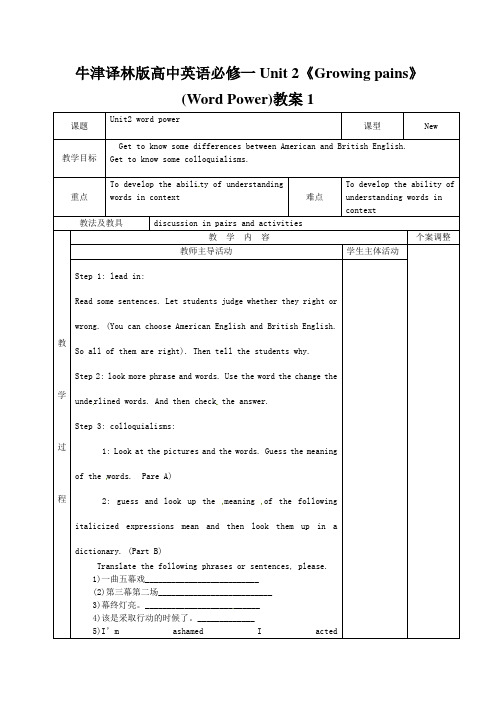
牛津译林版高中英语必修一Unit 2《Growing pains》(Word Power)教案1课题Unit2 word power课型New教学目标Get to know some differences between American and British English. Get to know some colloquialisms.重点To develop the abili ty of understandingwords in context 难点To develop the ability ofunderstanding words incontext教法及教具discussion in pairs and activities教学过程教学内容个案调整教师主导活动学生主体活动Step 1: lead in:Read some sentences. Let students judge whether they right orwrong. (You can choose American English and British English.So all of them are right). Then tell the students why.Step 2: look more phrase and words. Use the word the change theunde rlined words. And then check the answer.Step 3: colloquialisms:1: Look at the pictures and the words. Guess the meaningof the words. Pare A)2: guess and look up the meaning of the followingitalicized expressions mean and then look them up in adictionary. (Part B)Translate the following phrases or sentences, please.1)一曲五幕戏__________________________(2)第三幕第二场__________________________3)幕终灯亮。
牛津译林版高中英语必修一Unit 2《Growing pains》(Period 3)课件

学习下降或者更差。 [归纳拓展] worried adj.担心的;担忧的 worry vt.使担心;n.担心 worrying adj.令人担心的,使人发愁的 worry about...对……担心 be worried about...为……担心
[语境助记] (1)She is so worried about her exams. 她很担心自己的考试。
[语境助记] (1)He insisted on paying for the meal. 他坚持要付饭钱。
本 讲 栏 目 开 关
(2)We insisted that he (should come to) the party. 我们坚决主张他来参加聚会。 [题组训练] 用所给词的适当形式填空 (1)I insisted on
worried
mother was waiting for her son at the
gate.(worrying,worried)
4.He even forbids me from chatting with my friends in the Internet cafe!
本 讲 栏 目 开 关
[语境助记] (1)She couldn’t handle the pressures of her new job. 她无法应付新工作带来的压力。 (2)He is very good at handling difficult customers.
本 讲 栏 目 开 关
他很擅长对付挑剔的顾客。 [题组训练] (1) The car handles well roads. (2)It’s difficult to get a handle on exactly(确切地搞明白) how this law will affect us. (3)Please give me some advice on how to handle myself (怎样 控制自己) in an interview. (这辆汽车很好驾驶),even on wet
牛津译林版高中英语必修1Unit 2Growing painsReading教案4

Unit 2《Growing pains》Period 2 Reading 1(Comprehension focus)Teaching objectives:◆To develop students’ ability of reading a play◆To know about American family life and problems that happen between Americanteenagers and their parents◆To form a positive attitude towards solving problems between teenagers andparentsImportant and difficult points:Learn to analyze the emotions of each character from the instructions of the play. Teaching procedures:Step 1 Lead-in:Get students to think about the following questions:Have you ever watched the famous American TV comedy “Growing Pains”?Could you list some of the members of the family? (Show them a photo and tell them the family members.)What do you think of the play?If you were left alone, can you imagine what might happen?Step 2 readingPlease go through the Reading strategy and tell me how to read a play.(make sure students know how to read a play.)First reading:Get students to read the play and finish Part A individually.Answers1.Eric,Daniel, Mom and Dad.2. The room was a mess./ There was trash all over the place.3. Spot was ill.Second reading1.Mom and Dad were back from their holiday a week earlier.2.Eric was happy when seeing his mother.3. Parents left Daniel in charge.4.The boys spent the money seeing the vet for Spot.5.The room was very clean and tidy when their parents came back.6.Daniel didn’t have a chance to explain what had happened.7.Mom felt regretful for what they said to Daniel.8.Boys didn’t use up the money from their parents.Word studyChoose the correct one:1.I just finished my vacation to Yunnan.A. workB. holiday2. The man explained to the people that the factory had been close. to give meaning of sth. B. to give a reason for sth.3. When I went into the room, I found the room was in a mess.a difficult state B. a dirty or untidy state4. A teacher should trust his students.look after B. believe that sb. is good5. The woman was mad at the dog for eating her shoes.A. worriedB. angry6. It is rude to run into other’s house without knocking at the door.A. not politeB. anxiousDetailed reading1.Please read Act One of the play carefully and fill in the form2. Please read Act Two carefully and fill in form:Role-playDivide students into groups of five and one is the narrator and the others are the main characters. Role-play Act One and Act Two.Discussion1.Suppose you were one of the children what would you do?2.How do you think good parents should treat their children?3.Do you think there is a generation gap between you and your family? How can you deal with it?Homework:1 Write an end to the play.2 Role-play the dialogue in groups of five.。
牛津译林版高中英语必修一Unit 2《Growing pains》(Growing pains)教案

【教学目标】
1.To introduce and develop the theme of growing pains.
2.To develop speaking ability by talking about families and problems that happen between teenagers and parents.
How does his mother feel about the sห้องสมุดไป่ตู้ore?
What feelings may the boy have?
Step 4 Picture description
Imagine the situations and try to describe each picture as fully as po ssible with their own words.
3.To know more about classmates and their families.
【教学重点】Get students to understand what growing pains means.
【教学难点】Help students to form a positive attitude towards relationships between their parents and them.
Picture 1
What does the boy do?
What is the mother doing? How is she probably feeling?
What feelings may the boy have?
牛津译林版高中英语必修一Unit 2《Growing pains》(Test Papers)教案
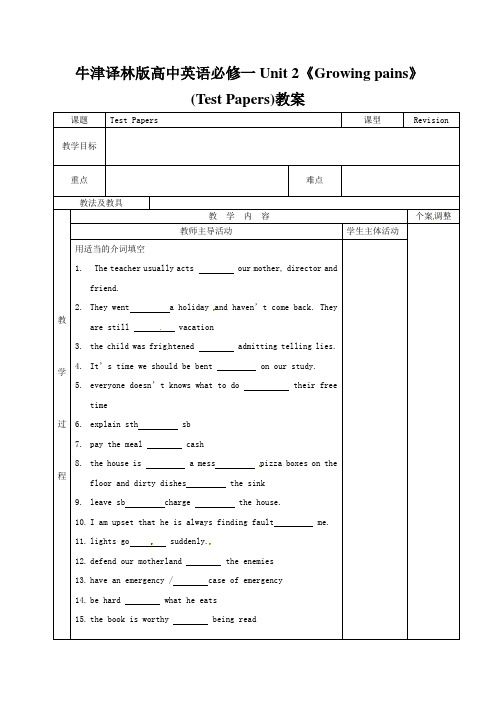
牛津译林版高中英语必修一Unit 2《Growing pains》(Test Papers)教案课题Test Papers 课型Revision 教学目标重点难点教法及教具教学过程教学内容个案调整教师主导活动学生主体活动用适当的介词填空1. The teacher usually acts our mother, director andfriend.2.They went a holiday and haven’t come back. Theyare still vacation3.the child was frig htened admitting telling lies.4.It’s time we should be bent on our study.5.everyone doesn’t knows what to do their freetime6.explain sth sb7.pay the meal cash8.the house is a mess pizza boxes on thefloor and dirty dishes the sink9.leave sb charge the house.10.I am upset that he is always finding fault me.11.lights go suddenly.12.defend our motherland the enemies13.have an emergency / case of emergency14.be hard what he eats15.the book is worthy being read16.be rude / it’s rude him to shouthis parents.教学过程教学内容个案调整教师主导活动学生主体活动17.the play is the f orm of a dialogue.18.there is a lot of garbage all the place.19.They went a holiday and haven’t come back. They arestill vacation20.the child was frightened admi tting telling lies.21.It’s time we should be bent on our study.22.everyone doesn’t knows what to do their freetime23.explain sth sb24.pay the meal cash25.the house is a mess pizza boxes on thefloor and dirty dishes the sink26.leave sb charge the house.27.I am upset that he is always finding fault me.28.lights go suddenly.29.defend our motherland the enemies30.have an emergency / case of emergency板书设计(用案人完成)当堂作业课外作业教学札记。
牛津译林版高中英语必修一Unit 2《Growing pains》(Language welcome )教案
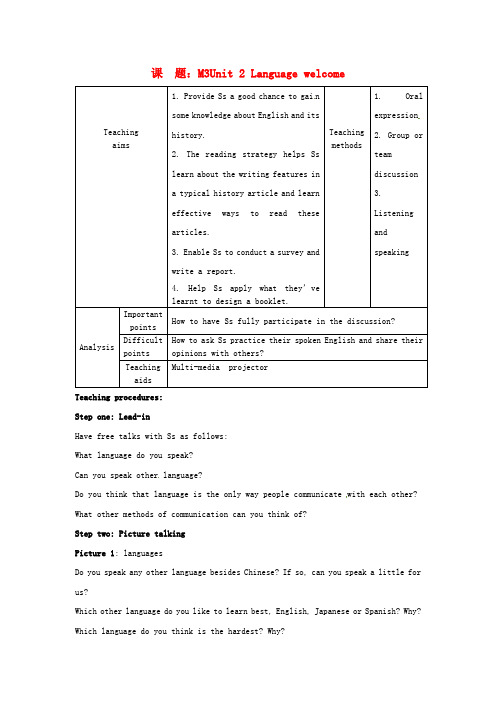
课题:M3Unit 2 Language welcome1. Provide Ss a good chance to gai nexpressionTeaching procedures:Step one: Lead-inHave free talks with Ss as follows:What language do you speak?Can you speak other language?Do you think that language is the only way people communicate with each other? What other methods of communication can you think of?Step two: Picture talkingPicture 1: languagesDo you speak any other language besides Chinese? If so, can you speak a little for us?Which other language do you like to learn best, English, Japanese or Spanish? Why? Which language do you think is the hardest? Why?Picture 2: EmotionsWhat does this emotion stand for? ( A beaming喜气洋洋的, 愉快的 smile.)What is an emotion?An intense mental state that arises subjectively rather than through conscious effort and is often accompanied by physiological changes; a strong feeling:冲the emotions of joy, sorrow, reverence, hate, and love.快乐、痛苦、尊敬、痛恨和爱的冲动When do people usually use this kind of language?(When they are talking on the Internet or sending short messages.)Could you give some more example s?(For example: ☹( :-( )stands for sadness; ☺( :))stands for happiness; :-o stands for surprise.)Picture 3: Sign languageWhat does this sign mean in Britain? (good luck)Do you thin k the same sign means the same to people all over the world? If you think so, can you show some examples and explain them?( Take the American gesture OK for example. Making a circle with one’s thumb and index finger(食指, first finger/forefinger) means ‘ money’ in Japan but ‘zero’ in France.Who needs to use sign language in their daily lives?(Deaf peo ple or those who are unable to hear)Have you ever used sign language? Is it helpful for you to communicate with others? Picture 4: BrailleA system of writing and printing for visually impaired or sightless people, in which varied arrangements of raised dots representing letters and numerals are identified by touchWhat is Braille? (A special language for blind people)Who invented Braille? ( A Frenchman called Louis Braille)Have you heard about him?What did he do for blind people? (He invented a special language for them, so itwas named after him.)Picture 5: Animal languageWhy do bees fly in circles? ( To inform their partners about food and danger)Do you believe animals can ‘talk’?If possible, ask Ss to share their stories about animal language they know.Step three: DiscussionEncourage Ss to discuss the three questions listed under the five pictures on page 21Then ask them to exchange their opinions and report their responses back to the whole class.Answers for discussion:1. WE have many other ways to exchange ideas or information.For example: Chinese people relayed fire signals at night and smoke signals in the day from one Great Wall watchtower to another in ancient times.To use pigeons to send messages in the past timeNowadays, to use the language of flowers to communicate meaningRose = love; tulip= formal announcement of love郁金香Forget-me-not = k eeping me in your memory. 勿忘草2. Chinese is the most spoken language, while English is the most widely used around the world.It’s useful to learn English if you want to travel, do business, or study abroad. What’s more, in 2008, the 29th Olympic Games will be held in Beijing. We are learning English to welcome people from other parts of the world.3. To learn English well, different people have different methods or ways.Step four: Listening1. Have Ss listen to tape and finish listening exercises on page 1042. Check answers together.Homework: 1. Go over what are learned in class.2. Do some reading on page 102教学反思:。
牛津译林版高中英语必修一Unit 2《Growing pains》 Period Four

答案 A
答案
课文阅读填空
Growing pains
Physical changes
Their body develops in many ways including
growing taller and voices getting 1.deeper
.
答案
· They have the feeling of 3. loneliness , as if nobody can understand them. · They find the changing world both inside and outside of them 4. confusing . · Many boys like taking 5. risks to find their own limits and the limits of the world around them, but sometimes they are not able to make good choices in their behaviour.
10.turn out
适应
结果是,证明是
答案
好句积累
1.As teenagers grow,it is normal for them to become confused with the changing world both inside and outside of them. 在青少年成长的时候,对自己无论是体内还是体外的状态变化感到困惑 对他们而言是正常现象。 2.Along with these physical changes, there come many psychological changes. 与这些生理变化同时而来的,还有很多心理上的变化。
译林牛津版必修1高中英语Unit2 Growing pains
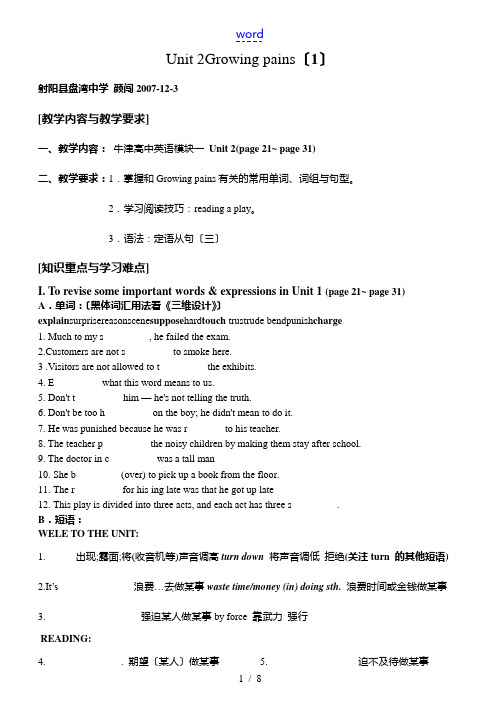
wordUnit 2Growing pains〔1〕射阳县盘湾中学颜闯2007-12-3[教学内容与教学要求]一、教学内容:牛津高中英语模块一Unit 2(page 21~ page 31)二、教学要求:1.掌握和Growing pains有关的常用单词、词组与句型。
2.学习阅读技巧:reading a play。
3.语法:定语从句〔三〕[知识重点与学习难点]I. To revise some important words & expressions in Unit 1 (page 21~ page 31)A.单词:〔黑体词汇用法看《三维设计》〕explain surprisereasonscene suppose hard touch trustrude bendpunish charge1. Much to my s_________, he failed the exam.2.Customers are not s_________ to smoke here.3 .Visitors are not allowed to t_________ the exhibits.4. E_________ what this word means to us.5. Don't t_________ him — he's not telling the truth.6. Don't be too h_________ on the boy; he didn't mean to do it.7. He was punished because he was r_______ to his teacher.8. The teacher p_________ the noisy children by making them stay after school.9. The doctor in c_________ was a tall man10. She b_________(over) to pick up a book from the floor.11. The r_________ for his ing late was that he got up late12. This play is divided into three acts, and each act has three s_________.B.短语:WELE TO THE UNIT:1.______出现;露面;将(收音机等)声音调高turn down 将声音调低拒绝(关注turn 的其他短语)2.It’s_______________浪费…去做某事waste time/money (in) doing sth.浪费时间或金钱做某事3.__________________ 强迫某人做某事by force 靠武力强行READING:4._______________. 期望〔某人〕做某事5._________________ 迫不及待做某事6._________________ 采纳某人的建议7.sb. ________________ 某人应该做某事;某人被要求,期望或认为做某事8._______ /___________ 对待处理应付9.______________________某事由某人负责10._____________________ 某任负责某事11._____________〔灯,火,蜡烛等〕熄灭12._____________使某事被做〔让人〕做某事表示主语的遭遇13._________________ 值得/应当/活该做某事14.____________ 对某人苛刻=be strict with sb15.________________________ 想要做某事16._____________________ 将A看作B /把B 当作A来看待WORD POWER:17._______…=be different in…. 在…方面不同18.______________=A be different from B A 和B不同19.___________…胜任/适合…..20.___________. 适合/胜任做某事21.____________ 保持健康22.____________将A换成B________________将A 变成B23._________________. 同某人换某物24.__________…. 要/找…..II. Sentences to be recited:1.Eric runs in after it, followed by a big dog,walking very slowly.(P22)Eric sits on his bed looking at Daniel, who has his arms crossed and looks angry.(P23)followed by a big dog / walking very slowly / looking at Daniel在句中作伴随状语。
高中英语必修1 unit2 growing pains详细讲义(译林牛津版】).doc

必修1 Unit2 Growing pains详细讲义第一讲【教学内容与教学要求】一、教学内容:牛津高中英语模块一Unit 2 (上)二、教学要求:1.学习谈论青少年经常遇到的问题。
2.学会戏剧脚本。
3.了解英语口语和书面语的差别。
4.语法:定语从句(三)【知识重点与学习难点】一、重要单词:act(n), scene, curtain, trash, garbage, charge, adult, , behavior, teenager, punish, period, argument, relationship, force, unpleasant, character, explain, slam, vet(veterinarian), style, mess, thumb, vs(versus), plus, competition, sink, fault, boring.二、重点词组:common to对…来说很普遍, turn up调高声音, 出现a waste of 浪费, no more不再, spare time空余时间, fo rce….to…强迫(某人)做, can’t wait to.. 迫不及待地要, be supposed to被期望或要求, 本应该,do with 处置, 忍受,需要be a mess/ in a mess乱成一团, leave sb in charge 委托…..负责, act like行为举止象…, go unpunished不受惩罚, go out熄灭, have one’s arm crossed双臂交叉抱在胸前, deserve to值得去做,常用否定形式表示“不配” be har d on对某人苛刻, now that既然, in the form of以的形式, than ever before比以前任何时候都, be angry at对某事生气, even if即使, treat sb like…象一样对待, argue about为…而争吵, the cause of起因, differ in many ways在许多方面不同, fit badly非常不合身。
牛津译林版必修一Unit2 growing pains

Module1Unit 2 Growing Pains新课标单词短语act n. (戏剧的)一幕vi. 表现;行动curtain n. 窗帘;(舞台上的)幕布surprise vt. 使吃惊,使惊奇be supposed to 应该……,应当……bend vi.&vt. 弯腰,屈身;(使)弯曲touch vt. 触摸;接触do with 处理,处置explain vt.&vi. 解释,说明mess n. 混乱,杂乱,一团糟sink n. 水泥,水槽,洗碗池garbage n. 垃圾can n. 罐子,金属容器leave vt. 使……处于某种状态,听任charge n. 负责,掌管adult n.成年人reason n. 原因,理由trust vt. 信任unpunished adj. 免受惩罚的teenager n. (13-19岁的)青少年fault n. 过错,错误go out (灯)熄灭mad adj. 狂怒的;疯狂的not ... anymore 不再,再也不hard adj. 苛刻的,严厉的be hard on 对……苛刻,对……要求严格now that 既然;由于rude adj. 粗鲁的,无礼的punish vt. 惩罚explanation n.解释,说明cash n.现金boring adj.令人厌倦的,乏味的,无聊的mark n.分数;标志,记号test n.&vt.混合;混淆,弄混mix up 混淆,弄乱;搅匀,拌和score n.&vt.使……感兴趣silly adj.愚蠢的sincerely adj.真诚地as though 好像,似乎insist on 坚持,坚持认为charge n. 负责,掌管adult n.成年人reason n. 原因,理由trust vt. 信任unpunished adj. 免受惩罚的teenager n. (13-19岁的)青少年fault n. 过错,错误go out (灯)熄灭mad adj. 狂怒的;疯狂的not ... anymore 不再,再也不hard adj. 苛刻的,严厉的be hard on 对……苛刻,对……要求严格now that 既然;由于cafe n.咖啡馆,小餐馆Internet cafe 网吧chat vt.&n.聊天,闲谈valuable adj.时间段,时期,阶段at present 目前,当前argument n.争论,辨论;论点,论据freedom n.自由relationship n.关系mainly adv.主要地;大体上suggest vt.建议;暗示,使想起fight vi.争吵,争论;打架,争斗crazy adj.发疯的,疯狂的like crazy 发疯似地,拼命地spare adj.空闲的;多余的selfish adj.自私的unloving adj.缺乏爱心的forbid vt.禁止Truly adv.真诚地;真实地课文出现短语1. turn up2. a waste of time3. try to do sth4. force sb to do sth5. spend time (in) doing sth6. be supposed to do sth7. in charge8. shout at9. give sb a chance to do sth10. deserve to do sth11. instead of12. be hard on sb13. now that14. be rude to sb15. feel like doing sth16. be different from sth17. in the form of18. pay attention to19. think of20. search…for21. a little bit 22. be proud of23. stay up24. mix up…with25. ask for sth26. stop doing sth27. mean to do sth28. keep in mind29. tidy up30. be angry with31. clean up32. a bit of33. at all34. invite sb to do sth35be busy with sth36. used to do sth37. be used to do sth38. be .used to doing sth39. refuse to do sth40. as though41. insist on42. prevent sb from doing sth43. forbid sb from doing sth44. argue about sth with sb45. allow sb to do sth46. do with47. go out48. not…any more49. after all50. at present51. like crazy52. choose…from53. can’t wait to do sth54. go unpunished55. should have done sth56. be nervous about sth57. all the time58. get sth done59. at the moment60. miss doing sth61. advise sb to do sth62. make a bit of difference63. be fit for64. ask to do sth,65. happen to sb一.单词应用根据单词的首字母或汉语意思填写正确单词,注意形式变化。
牛津译林版高中英语必修一unit 2《growing pains》 power优秀教案(重点资料).doc

课题:M1U2 Word Power【教学目标】Enable Ss to l earn some differences between A and E.【教学重点】Tell the differences between American English and British English. 【教学难点】How to tell American English from British English.【教具】Multi-media projector【作业布置】【教学后记】课题:M1U2 Grammar and usage主备:第6-7 课时总10 课时【教学目标】1. Enable the students to grasp the basic rules for attributive clauses—“prep. + which/whom”used to begin attributive clauses.2. To have a general idea of the usage of relative adverbs.3. To learn the studying strategy for language learning.【教学重点】Let students know the rules of attributive clauses.【教学难点】Let students understand the usage of relative adverbs.【教具】Multi-media projector引导非限制定语从句,从句作主语或宾语,代表e.g. This is the house in whturned down my offer.in which he lived two years ago.I will never forget the night when I met you for the first time.She wase.g. This is the place (where) I saw him last time.B. that【教学后记】*************************************。
最新牛津译林版高中英语必修一Unit 2《Growing pains》(Unit Review)课件

3. 毋庸置疑你应该劳逸结合。要知道, 身体健康是第一位 的。 It is _b_e_y_o_n_d__a_r_g_u_m_e_n_t_that you _a_r_e_s_u_p_p_o_s_e_d_t_o__b_a_la_n_c_e_your work and relaxation. After all, _p_h_y_s_i_c_a_l health is the most important.
5. 青少年渴望自由和独立这很正常, 但是我们也应该尊重父 母。自由和独立是有限度的, 但是我们的父母对我们的爱是 无限的。 It is _n_o_r_m__a_l for _t_e_en__a_g_er_s_ to _s_ta_r_v_e_f_o_r__fr_e_e_d_o_m__a_n_d_ _in_d_e_p_e_n_d_e_n_c_e_ but we should also respect our parents. _T_h_e_r_e_i_s _a_l_im__it__to_ freedom and independence but _th_e_r_e_i_s_n_o__li_m__it_t_o_ the love from our parents.
2. 我发现她很难相处, 总是对我吹毛求疵。因此跟她共事对 我来说是个很大的挑战。但是我有足够的耐心跟她好好相 处。 I find _sh_e__is__h_a_r_d_t_o_g_e_t__he is always _fi_n_d_i_n_g_f_a_u_lt__w_i_th_me. Therefore, it is a great _c_h_a_l_le_n_g_e_ to work with her. However, I have enough _p_a_t_i_e_n_c_e to get along well with her.
- 1、下载文档前请自行甄别文档内容的完整性,平台不提供额外的编辑、内容补充、找答案等附加服务。
- 2、"仅部分预览"的文档,不可在线预览部分如存在完整性等问题,可反馈申请退款(可完整预览的文档不适用该条件!)。
- 3、如文档侵犯您的权益,请联系客服反馈,我们会尽快为您处理(人工客服工作时间:9:00-18:30)。
[题组训练] (1)
Is there any limit
time we have?
( 有没有限制)to the amount of
(2)You can come and go when you want— (在一定限度之内). (3)We must
within limits
limit ourselves to
[题组训练] (1)介、副词填空 ①How does she keep smiling after all she has gone through so many difficulties? ②Maybe if I went meant. ③The lights in the classroom went ④Two months went
over
it all again I would see what she
out suddenly.
by
before wBiblioteka knew it.⑤Go away !Leave me alone.
(2)The old man,who grandfather. A.go through C.come out
[语境助记] (1)Japan limits the import of oranges. 日本限制橙子的进口。 (2)There seems to be no limit to his patience. 他的耐性似乎是没有限度的。 (3)There is a limit to what I can do for you. 我能为你做的事是有限的。
Period Four
Project
Language Focus
1.Boys and girls tend to be different in this regard. 关于这一点男孩和女孩往往会有不同。 [归纳拓展] tend vi.往往;趋向;vt.照看 tend to do sth.易于……,往往会做某事 tend towards sth.有……的趋势,倾向于…… tend to 照顾,照料
(限制我们自己) one gallon
of water per day.
(4)My brother is too fat,so my father has to and drink. A.save B.limit
B
his food
C.encourage D.affect 解析 句意为:我哥哥太胖,因此我父亲不得不限制他的
[语境助记] (1)He tends to get angry when people are against his plan. 别人反对他的计划时,他往往会生气。 (2)He likes listening to many kinds of music, but tends towards popular music. 他喜欢听许多种类的音乐,但是倾向于流行音乐。 [题组训练] (1)Sally tends to make mistakes (往往会出错) when she does her homework. (2)The nurse skillfully tended the soldier’s wound (护理这位士 兵的伤口). (3)Charles tends towards obesity(有……的趋势).
2....they want to find their own limits and the limits of the world around them,... …… 他 们 希 望 找 到 自 己 的 极 限 和 他 们 周 边 世 界 的 极 限,…… [归纳拓展] limit n.限制;极限;界限;vt.限制 within the limits of 在……的范围内 without limit 无限(制)地 limited adj.有限的,不多的
解析
D
World War Ⅱ,is Peter’s B.go out D.went through
go through 经历,经受。句意为:这位老人,经历
过第二次世界大战,他就是 Peter 的祖父。
4 . Along with these physical changes , there come many psychological changes. 与这些生理变化同时而来的,还有很多心理上的变化。 [归纳拓展] along with...与……一起,除了……以外(还) 当主语中含有 along with 时,谓语动词的数应与 along with 前面的主语一致,类似的词还有 as well as,together with, like,with 等。 get along with...与……和睦相处 [语境助记] (1)Teachers,along with students like the painting. 老师们和同学们都喜欢这幅画。 (2)He gets along well with his parents. 他与父母相处得很好。
饮食。
3.Many teenagers feel lonely,as if no one understands them and the changes they are going through. 许多青少年感到孤独,好像没有人理解他们以及他们正在 经历的变化。 [归纳拓展] go through 经过,经受,经历;仔细检查 go out (灯,炉火)熄灭 go up 上升;攀登;增长 go by (时间)过去;依据,按照 go away 走开 go over 复习;(仔细)检查;改变立场;车(翻倒)
[语境助记] (1)When he was a child,he went through one hardship after another. 孩提时代,他经历了一个又一个的艰难困苦。 (2)The policeman went through his suitcase,but he didn’t find anything unusual. 警察搜查了他的手提箱,但并没有发现异常的东西。
